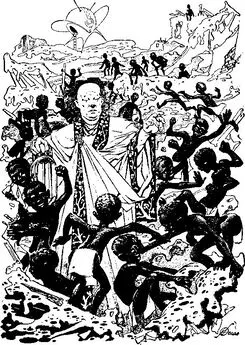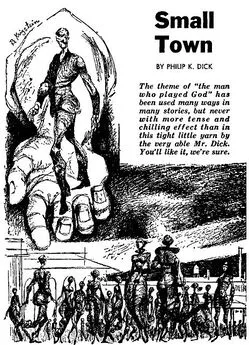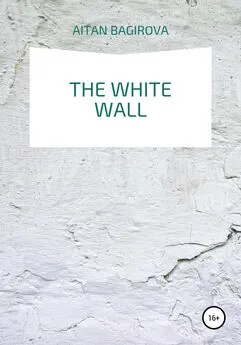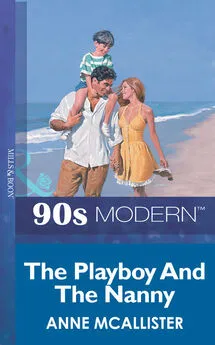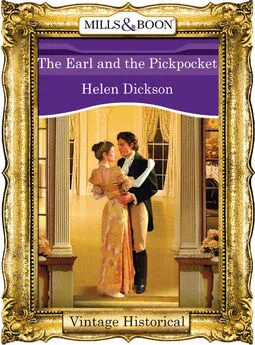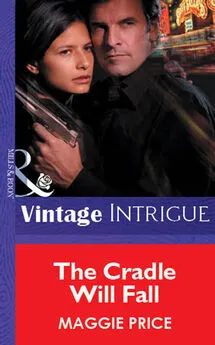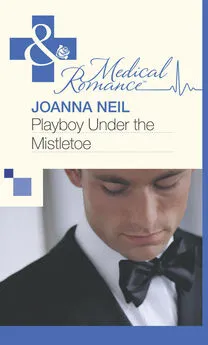Philip Dick - The Turning Wheel
- Название:The Turning Wheel
- Автор:
- Жанр:
- Издательство:неизвестно
- Год:неизвестен
- ISBN:нет данных
- Рейтинг:
- Избранное:Добавить в избранное
-
Отзывы:
-
Ваша оценка:
Philip Dick - The Turning Wheel краткое содержание
or might the great old culture be superimposed upon what was left of western technology?
The Turning Wheel - читать онлайн бесплатно полную версию (весь текст целиком)
Интервал:
Закладка:
"Clearness be with you,” the robot rasped obediently, as Sung-wu climbed out.
Sung-wu gathered up his bundle of reports and papers and stuffed them in a briefcase. He snapped the ship’s lock and hurried off toward the ruins of the city. The robot went back to dragging the rusty metal hook through the hard ground, its pitted body bent double with the strain, working slowly, silently, uncomplaining.
THE LITTLE boy piped, "Whither, Bard?" as Sung-wu pushed wearily through the tangled debris and slag. He was a little blackfaced Bantu, in red rags sewed and patched together. He ran alongside Sung-wu like a puppy, leaping and bounding and grinning white-teethed.
Sung-wu became immediately crafty; his intrigue with the blackhaired girl had taught him elemental dodges and evasions. 'My ship broke down,” he answered cautiously; it was certainly common enough. "It was the last ship still in operation at our field.”
The boy skipped and laughed and broke out bits of green weeds that grew along the trail. "I know somebody who can fix it," he cried carelessly.
Sung-wu’s pulse-rate changed. "Oh?” he murmured, as if uninterested. "There are those around here who practice the questionable art of repairing?”
The boy nodded solemnly.
"Technos?” Sung-wu pursued. "Are there many of them here, around these old ruins?"
More black-faced boys, and some little dark-eyed Bantu girls, came scampering through the slag and ruins. "What's the matter with your ship?" one hollered at Sung-wu. "Won't it run?”
They all ran and shouted around him, as he advanced slowly—an unusually wild bunch, completely undisciplined. They rolled and fought and tumbled and chased each other around madly.
"How many of you," Sung-wu demanded, "have taken your first instruction?”
There was a sudden uneasy silence. The children looked at each other guiltily; none of them answered.
"Good Elron!” Sung-wu exclaimed in horror. "Are you all untaught?”
Heads hung guiltily.
"How do you expect to phase yourselves with the cosmic will? How can you expect to know the divine plan? This is really too much!” He pointed a plump finger at one of the boys. "Are you constantly preparing yourself for the life to come? Are you constantly purging and purifying yourself? Do you deny yourself meat, sex, entertainment, financial gain, education, leisure?”
But it was obvious; their unrestrained laughter and play proved they were still jangled, far from clear— And clearness is the only road by which a person can gain understanding of the eternal plan, the cosmic wheel which turns endlessly, for all living things.
"Butterflies!” Sung-wu snorted with disgust. "You are no better than the beasts and birds of the field, who take no heed of the morrow. You play and game for today, thinking tomorrow won’t come. Like insects—”
But the thought of insects reminded him of the shiny-winged blue- rumped fly, creeping over a rotting lizard carcass, and Sung-wu’s stomach did a flip-flop; he forced it back in place and strode on, toward the line of villages emerging ahead.
FARMERS were working the barren fields on all sides. A thin layer of soil over slag; a few limp wheat stalks waved, thin and emaciated. The ground was terrible, the worst he had seen. He could feel the metal under his feet; it was almost to the surface. Bent men and women watered their sickly crops with tin cans, old metal containers picked from the ruins. An ox was pulling a crude cart.
In another field, women were weeding by hand; all moved slowly, stupidly, victims of hookworm, from the soil. They were all barefoot. The children hadn’t picked it up yet, but they soon would.
Sung-wu gazed up at the sky and gave thanks to Elron; here, suffering was unusually severe; trials of exceptional vividness lay on every hand. These men and women were being tempered in a hot crucible; their souls were probably purified to an astonishing degree. A baby lay in the shade, beside a half-dozing mother. Flies crawled over its eyes; its mother breathed heavily, hoarsely, her mouth open. An unhealthy flush discolored her brown cheeks. Her belly bulged; she was already pregnant again. Another eternal soul to be raised from a lower level. Her great breasts sagged and wobbled as she stirred in her sleep, spilling out over her dirty wraparound.
"Come here,” Sung-wu called sharply to the gang of black-faced children who followed along after him. "I'm going to talk to you.”
The children approached, eyes on the ground, and assembled in a silent circle around him. Sung-wu sat down, placed his briefcase beside him, and folded his legs expertly under him in the traditional posture outlined by Elron in his seventh book of teachings.
"I will ask and you will answer,” Sung-wu stated. "You know the basic catechisms?” He peered sharply around. "Who knows the basic catechisms?”
One or two hands went up. Most of the children looked away unhappily.
"First!” snapped Sung-wu. " Who are you? You are a minute fragment of the cosmic plan.
"Second! What are you? A mere speck in a system so vast as to be beyond comprehension.
"Third! What is the way of life? To fulfill what is required by the cosmic forces.
"Fourth! Where are you? On one step of the cosmic ladder.
"Fifth! Where have you been? Through endless steps; each turn of the wheel advances or depresses you.
"Sixth! What determines your direction at the next turn? Your conduct in this manifestation.
"Seventh! What is right conduct? Submitting yourself to the eternal forces, the cosmic elements that make up the divine plan.
"Eighth! What is the significance of suffering? To purify the soul.
"Ninth! What is the significance of death? To release the person from this manifestation, so he may rise to a new rung of the ladder.
"Tenth—”
But at that moment Sung-wu broke off. Two quasi-human shapes were approaching him. Immense white-skinned figures striding across the baked fields, between the sickly rows of wheat.
Technos—coming to meet him; his flesh crawled. Caucs. Their skins glittered pale and unhealthy, like nocturnal insects, dug from under rocks.
He rose to his feet, conquered his disgust, and prepared to greet them.
SUNG-WU said, "Clearness!" He could smell them, a musky sheep smell, as they came to a halt in front of him. Two bucks, two immense sweating males, skin damp and sticky, with beards, and long disorderly hair. They wore sailcloth trousers and boots. With horror Sung-wu perceived a thick body-hair, on their chests, like woven mats—tufts in their armpits, on their arms, wrists, even the backs of their hands. Maybe Broken Feather was right; perhaps, in these great lumbering blond-haired beasts, the archaic Neanderthal stock—the false men—still survived. He could almost see the ape, peering from behind their blue eyes.
"Hi,” the first Cauc said. After amoment he added reflectively, "My name’s Jamison.”
"Pete Ferris,” the other grunted. Neither of them observed the customary deferences; Sung-wu winced but managed not to show it. Was it deliberate, a veiled insult, or perhaps mere ignorance? This was hard to tell; in lower classes there was, as Chai said, an ugly undercurrent of resentment and envy, and hostility.
"I’mmaking a routine survey,” Sung-wu explained, "on birth and death rates in rural areas. I’ll be here a few days. Is there some place I can stay? Some public inn or hostel?”
The two Cauc bucks were silent. "Why?” one of them demanded bluntly.
Sung-wu blinked. "Why? Why what?”
"Why are you making a survey? If you want any information we'll supply it.”
Sung-wu was incredulous. "Do you know to whom you’re talking? I’m a Bard! Why, you’re ten classes down; how dare you—” He choked with rage. In these rural areas the Technos had utterly forgotten their place. What was ailing the local Bards? Were they letting the system break apart?
He shuddered violently at the thought of what it would mean if Technos and Farmers and Businessmen were allowed to intermingle —even intermarry, and eat, and drink, in the same places. The whole structure of society would collapse. If all were to ride the same carts, use the same outhouses; it passed belief. A sudden nightmare picture loomed up, before Sung-wu of Technos living and mating with women of the Bard and Poet classes. He visioned a horizontally-oriented society, all persons on the same level, with horror. It went against the very grain of the cosmos, against the divine plan; it was the Time of Madness all over again. He shuddered.
"Where is the Manager of this area?” he demanded. "Take me to him; I'll deal directly with him.”
The two Caucs turned and headed back the way they had come, without a word. After a moment of fury, Sung-wu followed behind them.
THEY LED him through withered fields and over barren, eroded hills on which nothing grew; the ruins increased. At the edge of the city, a line of meager villages had been set up; he saw leaning, rickety wood huts, and mud streets. From the villages a thick stench rose, the smell of offal and death.
Dogs lay sleeping under the huts; children poked and played in the filth and rotting debris. A few old people sat on porches, vacantfaced, eyes glazed and dull. Chickens pecked around, and he saw pigs and skinny cats—and the eternal rusting piles of metal, sometimes thirty feet high. Great towers of red slag were heaped up everywhere.
Beyond the villages were the ruins proper—endless miles of abandoned wreckage; skeletons of buildings; concrete walls; bathtubs and pipe; overturned wrecks that had been cars. All these were from the Time of Madness, the decade that had finally rung the curtain clown on the sorriest interval in man’s history. The five centuries of madness and jangledness were now known as the Age of Heresy, when man had gone against the divine plan and taken his destiny in his own hands.
They came to' a larger hut, a two-story wood structure. The Caucs climbed a decaying flight of steps; boards creaked and gave ominously under their heavy boots. Sung-wu followed them nervously; they came out on a porch, a kind of open balcony.
On the balcony sat a man, an obese copper-skinned official in unbuttoned breeches, his shiny black hair pulled back and tied with a bone against his bulging red neck. His nose was large and prominent, his face, flat and wide, with many chins. He was drinking lime juice from a tin cup and gazing down at the mud street below. As the two Caucs appeared he rose slightly, a prodigious effort.
"This man,” the Cauc named Jamison said, indicating Sung-wu, "wants to see you.”
Sung-wu pushed angrily forward. "I am a Bard, from the Central Chamber; do you people recognize this?" He tore open his robe and flashed the symbol of the Holy Arm, gold worked to form a swath of flaming red. "I insist you accord me proper treatment! I’m not here to be pushed around by any—”
HE HAD SAID too much; Sung-wu forced his anger down and gripped his briefcase. The fat Indian was studying him calmly; the two Caucs had wandered to the far end of the balcony and were squatting down in the shade. They lit crude cigarets and turned their backs.
"Do you permit this?” Sung-wu demanded, incredulous. "This— mingling ?”
The Indian shrugged and sagged down even more on his chair. "Clearness be with you,” he murmured; "will you join me?" His calm expression remained unchanged; he seemed not to have noticed. "Some lime juice? Or perhaps coffee? Lime juice is good for these." He tapped his mouth; his soft gums were lined with caked sores.
Читать дальшеИнтервал:
Закладка:
